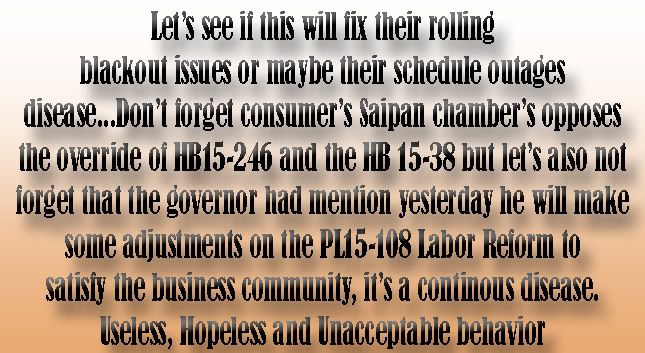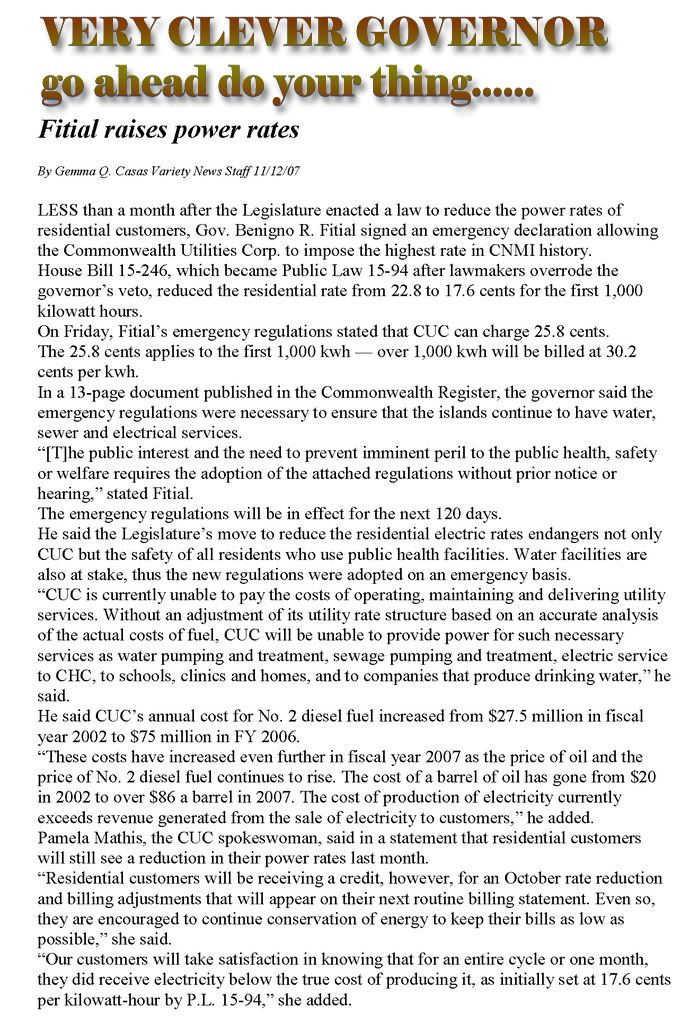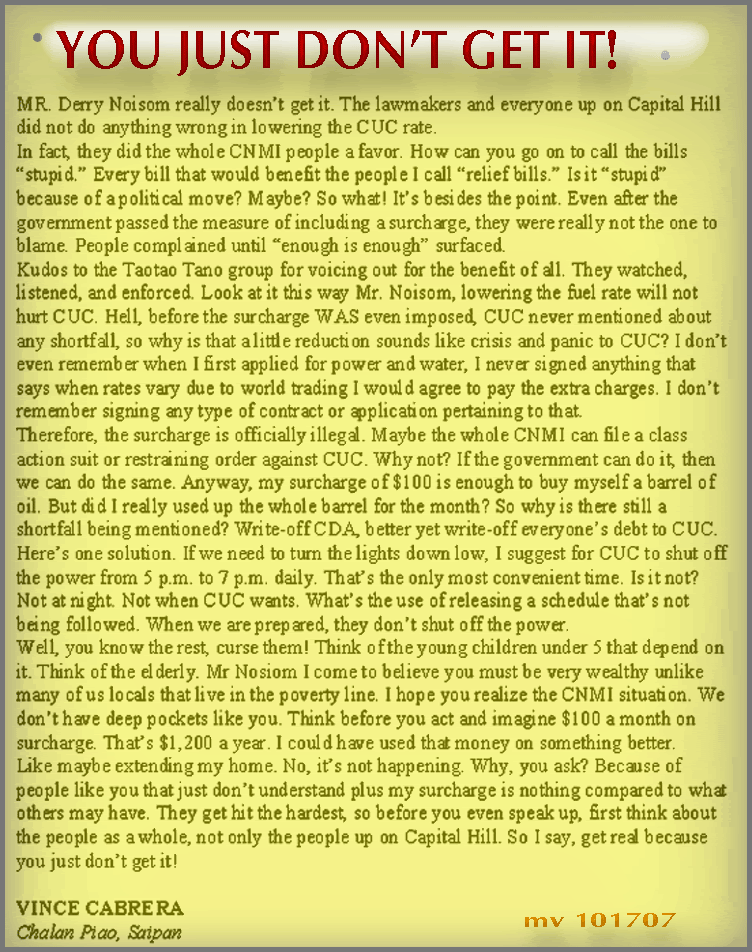January 1st, 2006
Power crisis reveals lingering CUC woes
Faced by recurring blackouts stemming from a lack of fuel supply and owing to the Commonwealth Utilities Corp.'s rock bottom cash situation, Gov. Juan N. Babauta declared a state of emergency on utilities during his State of the Commonwealth Address on May 19 this year.While the intention was considered noble-which was to ensure a stable power supply-the governor's declaration was much criticized, especially by the political opposition, since his action attested to the severe financial crisis of the government, on the face of his much-parodied insistence that the state of the Commonwealth was “still pretty darn good.”The declaration lasted not for a month or two but seven whole months, or just weeks before the end of the governor's term. Meantime, immediately following the emergency declaration, which placed the entire CUC under the direct supervision of the governor, the government obtained a commitment from CUC's lone fuel supplier, Mobil Oil Marianas, to deliver a month-long supply of fuel.At the same time, negotiations between the government and Mobil continued for a long-term fuel supply contract.This negotiation, headed by Lt. Gov. Diego T. Benavente and governor's advisor Adam Turner, culminated with the signing of a two-year contract with Mobil in early June 2005, amounting to at least $60 million.Mobil's previous contract with CUC expired on April 30.Due to CUC's pitiful fiscal condition, it could not arrange for another contract with the fuel company by itself.Then CUC executive director Lorraine A. Babauta cited that the rising cost of fuel has taken its toll on CUC, and the governor was needed “to step in and assist in any way possible to make sure that a fuel contract is executed at the earliest possible time.”“That's basically what's been keeping us from moving forward,” the CUC official had said.She cited that CUC fuel costs have risen from $30 million annually to $60 million in 16 months.REPROGRAMMING With the emergency declaration came the reprogramming of funds and the hiring of “consultants” to arrest the power crisis, which was later discovered to be caused not only by the lack of fuel but the neglect and poor maintenance at CUC's power generation plants in Lower Base.From May 19 to October 2005, the governor reported the reprogramming of some $5.1 million in local funds and $2.6 million in federal funds. Later, the governor said that the Marianas Public Lands Authority had also chipped in by reprogramming $1 million for CUC.Recently, CUC reportedly said that it received an additional $1 million from the administration. It was expecting some $500,000 from the administration as of last week.LEGISLATURE OKS REPROGRAMMINGA week after Babauta declared the emergency, the House of Representatives, headed by opposition Speaker Benigno R. Fitial adopted House Joint Resolution 14-36, granting the governor 100 percent authority to reprogram any available local funds to remedy the power crisis.The measure, which was introduced by Fitial himself, also passed the Senate shortly.“The Legislature supports the governor's declaration of state of disaster emergency. It is the intent of the Legislature to authorize the governor 100 percent reprogramming authority from available Commonwealth funds to remedy the power generation problems,” reads part of the resolution.The resolution, however, prohibited the governor from entering into any public debt without the approval of the Legislature, as provided in the CNMI Constitution Article 10, Section 3. This came about after learning that the Executive Branch and CUC entered into a $10-million letter of credit with the Bank of Guam following the May 19 emergency declaration.Babauta said, though, that the standby letter of credit with BoG is not public indebtedness, pointing out that CUC is a semi-public corporation that has its own assets. In the end, the administration said Mobil's new contract incurred no new long-term credit with the bank.It said that the new fuel contract called for a cash guarantee to Mobil of $7.5 million. This guarantee was made by securing CUC funds that were “already in the Bank of Guam” against fuel purchases.Authorities said the CUC has some $9 million in restricted funds at BoG.NEGLECTED GENERATORSAfter the fuel contract was secured, CUC's Lorraine Babauta revealed that the maintenance of engines “also remains a serious issue.”She said in early June that renovation and other improvements on existing engines would cost over $2 million.KUMOI'S CONTRACTExpressing possible abuse of authority under the emergency declaration, the political opposition revealed that CUC had entered into consultancy contracts with former senator and former CUC executive director Ramon “Kumoi” Guerrero and California-based electrical engineer Roger Kitchingham to fix CUC's engines.Initial documents showed that CUC approved a $21,000-purchase order for Guerrero and a $20,000-agreement for Kitchingham for the repair of CUC power plant II, which is adjacent to the main power plant, Power Plant I.Before this, Guerrero had secured a separate $50,000-consultancy contract with the Governor's Office for the La Fiesta complex.The former senator's entry as Babauta's consultant during an election year was put under close watch since he was previously associated with the opposition, particularly with Fitial. “We need to watch carefully to make sure that what is actually done is in the best interest of taxpayers and public utilities, and not patronage or political maneuvering using taxpayers' funds,” Fitial's spokesman, Charles Reyes, had said.But the opposition only had to wait for a little time as Guerrero's power plant consultancy was not for long.On Aug. 1, shortly after finishing his contract or the non-renewal of it, Guerrero was the guest of honor at a House panel's public hearing, lashing out at CUC's “incompetence” in handling the power generation business.Guerrero expressed his anger over Attorney General Pamela Brown's so-called interference, which he said was causing the delay in the repair of engines.The AGO refuted this, alleging that it was Guerrero who tried to manipulate CUC and overlook procurement rules to sole-source contracts.FUEL SURCHARGEThe Legislature, initiated by the House leadership, moved to repeal the fuel surcharge fee, which the CUC had imposed effective March this year on all CUC customers.The measure, House Bill 14-343, authored by Vice Speaker and former CUC executive director Timothy Villagomez, aims to repeal the law, 4 CMC section8148 (b) , which gives the CUC board the authority to impose up to 3.5 cents fuel surcharge per kilowatt hour.Despite public clamor for its repeal, Gov. Babauta vetoed the bill, retaining the fuel surcharge.Before this, the governor asked the Legislature to appropriate funds for CUC if it wants the bill enacted into law. Babauta said that while he sympathized with consumers, he said that removing the fuel surcharge without an alternative fund would mean the collapse of the local utility firm.He challenged the Legislature to appropriate $31 million to let CUC buy fuel to run the power plants in the next 15 months, appropriate funds to pay CUC debts (amounting to some $18 million), and appropriate funds for government utilities.The Legislature only appropriates $5 million for utilities annually. The government, however, paid a total of $12 million to CUC as of early September 2005.PRIVATIZATIONDuring the emergency, CUC also pursued the proposed privatization of power generation.As of July, CUC privatization consultant, Dennis Swann of Harris Group, said that a privatization contract would be signed in less than two months. This, however, did not materialize following a financial audit review of two proposers: Telesoure and Rolls Royce.After the Nov. 5 elections, the governor, likewise, echoed the position of the Saipan Chamber of Commerce that it was impractical for the CNMI government to commit itself to a 20-year privatization program in view of skyrocketing oil prices.He also said that in 20 years, there may be a cheaper alternative to fuel.The privatization called for the takeover of the eight-engine Power Plant I in Lower Base, its rehabilitation and upgrade to meet environmental standards, and installation of two new 15MW generators. The contract would allow the private company to operate the machines for 20 years.HOUSE OPPOSES REPROGRAMMING After three months of continued emergency, the House of Representatives changed its position on the reprogramming of funds for CUC. In a resolution, the House now accused Babauta of illegally reprogramming funds to CUC.The House demanded that the governor submit to the Legislature a complete financial analysis of his alleged illegal diversion of funds.The House also asked the Office of the Public Auditor and the Attorney General's Office “to investigate the illegal use of public funds by the governor.”These demands are contained in House Joint Resolution 14-42, which the House adopted during its session in early September.It cited that, under the law, 1 CMC subsection 7402 and 1 CMC subsections 7302 and 7403, “no funds may be reprogrammed, and no obligation or contract for the expenditure of Commonwealth funds shall be made for any purposes other than the public purposes for which the funds are appropriated.” It said that the law also provides that “no Covenant funds may be reprogrammed or otherwise transferred or borrowed from capital improvement and economic development accounts to government operational accounts.”It further said that the governor is only allowed by law to reprogram up to 25 percent of funds appropriated by the annual appropriation for the operations of the government.Any reprogramming that exceeds the 25 percent limit shall be subject to prior approval by the Legislature, the House said. Press secretary Peter A. Callaghan countered this by saying that the governor could have not done any illegal reprogramming because he has that authority under an emergency situation.Further, he said that the Legislature gave him 100 percent reprogramming authority to address the CUC power crisis. EMERGENCY ENDEDOn Dec. 13, the governor announced his decision to end the seven-month state of emergency and return the management of CUC to its board of directors effective Dec. 16.Without the state of emergency, the Governor's Office will no longer have the authority to reprogram funds from other government services to subsidize CUC's fuel purchases and other expenses.Two tankers are due to deliver power generation fuel on Jan. 8, 2006, requiring about $6.8 million in payment from CUC. The governor said that the government could raise only up to $2.5 million for CUC by end of December.Babauta's last day in office is this Friday, Jan. 6. His political opponent, Gov.-elect Benigno R. Fitial, will be inaugurated on Jan. 9.Babauta believes that, under his last trying year in office, he managed to rescue the CUC power plants from near collapse.He said the Commonwealth “is no longer threatened by a catastrophic collapse of the utility system.”Right now, CUC generates approximately 68 megawatts of power, just enough to meet peak demand. By design, Power Plant I has a capacity of 81.2MW, Power Plant 2 has 15MW, and Power Plant 4 in Puerto Rico has 17.5MW.Power plant 3's three engines, which have a capacity of 4.5MW, are all currently down.CUC plans to revive Power Plant 3 and relocate it from the airport area to the main power plant in Lower Base.
Sunday, December 30, 2007
Subscribe to:
Post Comments (Atom)
.
.
TAOTAO TANO UPDATES
- WATCH OUR LATEST VIDEO!!
- 120707 mv - Taotao Tano prepares for power plant tour
- 112807 mv -Taotao Tano wants to see CUC power plants, offices
- 113007 mv -Taotao Tano blames lawmakers for passing defective law
- 112907 mv-Taotao Tano slams CUC on security deposit
- 111307 mv -Fitial’s power rate hike sends Taotao Tano back to the street
FLASH BACK 2006
CONSUMERS OPINION ON CUC
WHAT IS RISING OUT IN THE COMMUNITY
HEAR WHAT CUC HAS TO SAY
- MV 121007 - Administration takes over CUC, again
- 120607 mv - Falling trees cause islandwide blackout
- 120507 mv - CUC will again charge record-high power rates this month
- 113007 mv -CUC short by $2.5M for fuel payments
- 112907 mv -4 power generators still down
- 113007 mv - Only 3 engines running at main power plant
- 112207 mv- Emergency blackout hits Saipan
LEGISLATURE OPINION & RESPONSE ON CUC
NEW ELECTED REPRESENTATIVES OPINIONS ON CUC
OPA FINDINGS ON CUC & ITS BILL
.
.
TAOTAO TANO PROPOSAL PAGE 1

TAOTAO TANO PROPOSAL PAGE 2
















No comments:
Post a Comment